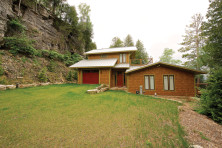DNR Calls for Efficiency with Reorganization
- Share
- Tweet
- Pin
- Share
A proposed reorganization of the Department of Natural Resources (DNR) over the next year will consolidate the department’s divisions to seek efficiency, but some are viewing the changes as a dismantling, with an inevitable reduction in the department’s services.
The changes come at the heels of a funding crisis at Wisconsin state parks, with lawmakers suggesting fee increases and corporate naming rights leading into the next budget cycle.
“DNR recently rolled out a plan to better align our current resources with the core work that our dedicated employees do in carrying out our mission of protecting the state’s natural resources for all,” wrote DNR Secretary Cathy Stepp in an editorial. “In some cases, several programs that have overlapping areas of responsibility are being consolidated into one efficient unit that can address issues more effectively and free up time from non-essential work so staff can focus on what this agency has been charged to do.”
Despite assurance in upholding current laws, rules and standards, many are skeptical of the department’s ability to perform its duties, which could include a reduction of staff, when the alignment is complete.
“The change involved regrouping several functions to improve consistency with processes such as fish, wildlife and habitat management and permitting,” said Jennifer Sereno, communications manager at the DNR.
The greatest concern to residents in northeast Wisconsin is the change in how environmental permits for livestock operations are written.
Currently, farm operators hire consultants who work with DNR staff to complete permits for their livestock operations. Under realignment, the DNR will provide a list of qualified consultants that farmers can hire to do the permits and nutrient management plans, called an assurance program, with the DNR removing itself from the process except for review of the final permit. Claiming the current process results in inefficient back and forth between the DNR and farmers, the DNR believes receiving an application from a trusted consultant will require less scrutiny from DNR staff, freeing them up for other duties.
Some believe that consultants will be biased toward the farmers who are paying them while being skeptical that the DNR will actually review the permits coming in the door.
“It’s not a true review, nobody’s actually verifying things on the ground,” said Lynn Utesch, a Kewaunee County farmer and member of the environmental stewardship group Kewaunee CARES, at a listening session with Rep. Joel Kitchens on Dec. 5. “We know that that system is failing now. What’s going to make this system work better when the permits are going to be written by the polluters?”
That failing system revealed itself in a report from the Legislative Audit Bureau earlier this year stating that the DNR failed to follow through with 94.1 percent of wastewater violations.
By putting more of the workload on the farmer and consultant, the DNR hopes to free up more time for work on the ground and bring that number of failed enforcement on violations down.
“The resulting staff time savings will be reallocated to doing more site inspections for compliance checks as well as working more with applicants early in the permitting process,” said Sereno. “An assurance program will shorten the [Nutrient Management Plan] approval process and give the [Concentrated Animal Feeding Operator] a level of comfort that an NMP was prepared for their farm that is compliant with the regulations.”
Kitchens has taken the DNR at their word that the permit process will not result in a lack of regulation and enforcement of livestock operations.
“A lot of it is so they have more personnel to deal with CAFO issues. That’s their plan,” said Kitchens. “[Farmers and consultants] will write the permit but then the DNR will review all of those.”
County conservationist Greg Coulthurst raised another concern about the reorganization of the state’s foresters, which he fears will lead to a reduction of services in Door and Kewaunee counties.
Under the realignment, the department will divide duties currently performed by the state’s foresters into more specialized positions. Tax law specialists will handle the Managed Forest Law (MFL), which provides tax incentives for private forest preservation. Integrated foresters will then be on the ground servicing both private landowners outside of the MFL program and public forests.
Sereno said the DNR office in Sturgeon Bay could be a location for either a tax law specialist or an integrated forester. There are currently two DNR foresters at the Sturgeon Bay office who serve both Door and Kewaunee counties.
“Our county foresters provide a bigger service than most people realize, and with the onset of Emerald Ash Borer, Beech Bark Disease, and other invasive species, decreasing service to the public will have longlasting negative impacts to the environment here in Door County,” said Coulthurst.
Sereno did not confirm whether there would be a reduction of staff in the forestry division.
Realignment will take place throughout 2017 with final changes being implemented in early 2018. Sereno said the DNR has not received any specific recommendations for changes, but will be open to feedback from the legislature, governor’s office and other stakeholders moving forward.

